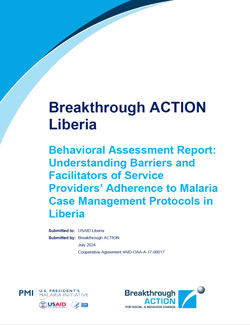Behavioral Assessment Report: Understanding Barriers and Facilitators of Service Providers’ Adherence to Malaria Case Management Protocols in Liberia
Breakthrough ACTION is a global project funded by the United States Agency for International Development (USAID) to lead social and behavior change (SBC) programs around the world. The project ignites collective action and encourages people to adopt healthier behaviors. This work harnesses the demonstrated power of communication and integrates innovative approaches from marketing science, behavioral economics, and human-centered design.
In Liberia, Breakthrough ACTION supports the increased adoption of health behaviors among individuals, families, and communities. The Breakthrough ACTION Liberia project uses an integrated health approach to promote a full suite of healthy behaviors across the areas of malaria; reproductive, maternal, newborn, child, and adolescent health (RMNCAH); family planning (FP); nutrition; zoonotic diseases; and water, sanitation, and hygiene (WASH)—all areas that have been identified as priority areas by the Liberian Ministry of Health and USAID.
Working closely with the Government of Liberia and partners, Breakthrough ACTION conducted an assessment of 27 service providers in 12 health facilities in three districts in Liberia to better understand service providers’ barriers and facilitators related to following the Government of Liberia’s malaria case management protocols. This report presents insights from an assessment using a behavioral economics approach on the range of environmental factors influencing providers’ adherence to case management protocols, and a range of possible behavioral solutions that, together, can create a more enabling environment for protocol adherence and improved delivery of quality care. The research elicited five key behavioral insights and recommendations that can be used to improve adherence to case management protocols.
Last modified: August 20, 2024
Language: English
Source: Johns Hopkins Center for Communication Programs
Year of Publication: 2024

